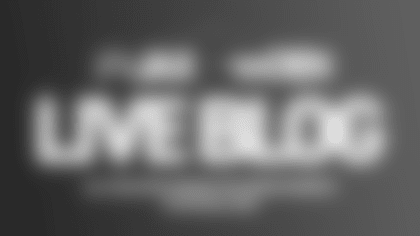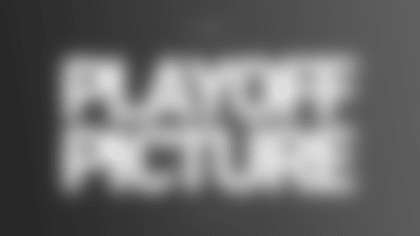Join Jaguars Inside Report Senior Editor Vic Ketchman as he tackles the fans' tough questions.
Lawrence from Jacksonville:
My memory isn't what it used to be. Aren't the Jaguars affiliated with the BLESTO scouting service?
Vic: The answer is yes. Since you've asked, I'll use the opportunity to describe what BLESTO is. The letters stand for "Bears, Lions, Eagles, Steelers Talent Organization." In the early 1960s, those four teams formed what was then the game's only and, I believe, first scouting combine. In other words, they pooled their information. Other teams quickly joined. Today, there are two scouting combines that service the NFL: BLESTO and National. Those teams that belong to BLESTO are: Atlanta, Buffalo, Chicago, Cleveland, Dallas, Detroit, Houston, Jacksonville, Miami, Minnesota, NY Giants, Pittsburgh. Those teams that belong to National are: Arizona, Carolina, Cincinnati, Denver, Green Bay, Kansas City, New Orleans, NY Jets, Philadelphia, St. Louis, San Diego, San Francisco, Seattle, Tampa Bay, Tennessee and Washington. Baltimore, Indianapolis, New England and Oakland belong to neither service.
Don from Jacksonville:
I was just looking at the Titans' website and I noticed they have a waiting list for season tickets. How many NFL teams have waiting lists?
Vic: Several teams have waiting lists. I'll give you some others off the top of my head: Green Bay, Pittsburgh, Tampa Bay, Kansas City, Denver, Washington and the New York Giants.
David from Oviedo, FL:
Concerning Peyton Manning's possible hit of $18 million, didn't the Giants pay Michael Strahan over $20 million last year? If so, could you be sending Manning into free agency prematurely?
Vic: OK, let's begin with the facts. Michael Strahan got a new deal prior to the 2002 season, not '03, and, yes, the Giants gave him a lot of money. But the deal contained a lot of guaranteed money and a lot of years, and was structured in such a way to include a lot of amortization that was pushed out onto future salary caps. The bottom line is Strahan's salary cap hit last year was just $4.3 million and will only be $6.6 million this year. That could very well happen between the Colts and Peyton Manning, but there are a couple of major differences between Manning and Strahan: 1. Manning is a quarterback; Strahan is a defensive end. 2. Strahan had a full season remaining on his contract and his new deal was nothing more than an extension and re-structuring; Manning's contract has expired and he's only 15 days from becoming an unrestricted free agent. I'm not sending Manning into free agency, but one way or another he's going to hurt the Colts; either by leaving or by staying. The point I've tried to make all along is that when you allow a contract situation to get that far out of hand, you're gonna suffer some harsh consequences.
Kamal from Novi, MI:
What is the reason for all this trade talk this year? I've heard rumors regarding trades for Mark Brunell, Champ Bailey, Plaxico Burress, Randy Moss and Jeff Garcia. I thought trades were rare in the NFL. Do you think that trend is changing?
Vic: The salary cap is the reason for trade talk. Teams are trying to recoup value for players they can't afford to keep. I'm not prepared to say the trend is changing, though. Draft picks are still more valuable than veteran players. There's also another factor in trade talk involving established players: Their deals must be almost out of amortization, or teams couldn't even consider trading them. In Champ Bailey's case, his contract has expired. In Mark Brunell's case, and in other cases, a trade can be made because the accelerated amortization would be minimal. That means teams are either doing a more responsible job of structuring contracts, or players at the ends of their contracts are being targeted.
Emory from Marion, NC:
This is something I have long wondered: Why are the rules so different between college football and the NFL? As far as I know, no other sports have that many differences.
Vic: The difference between the rules that govern college and professional football are similar to the rules differences between college and professional basketball. Professional sports is a significant step up from amateur athletics. The best players in the world should be expected to get two feet in bounds; amateurs only one. If you applied NFL rules to college football, the result might be embarrassing. If you don't think there's a major difference in talent on the two levels, you're living in a dream world. What did the U.S. "Dream Team" teach us in Olympic basketball?
Robert from Ventnor, NJ:
I've heard Champ Bailey wants out of Washington, and since they are already interested in Brunell, is there any chance of the Jags landing him rather than acquiring draft picks?
Vic: What's wrong with acquiring a draft pick? It's a great year for cornerbacks, and you'd get one in the draft a lot cheaper than it would cost you to sign Champ Bailey. If you're going to trade for Bailey and sign him to a new deal, you'd have to believe he is one of the most dominant players in the NFL, because he's going to get one of the league's most dominant contracts.
Dino from Jacksonville:
With Fernando Bryant possibly leaving, the Jaguars' pass-defense appears pretty bad for next season. What do you think can be done to solve this problem?
Vic: What's wrong with Rashean Mathis? Draft another one and, all of a sudden, cornerback becomes a position of strength.













